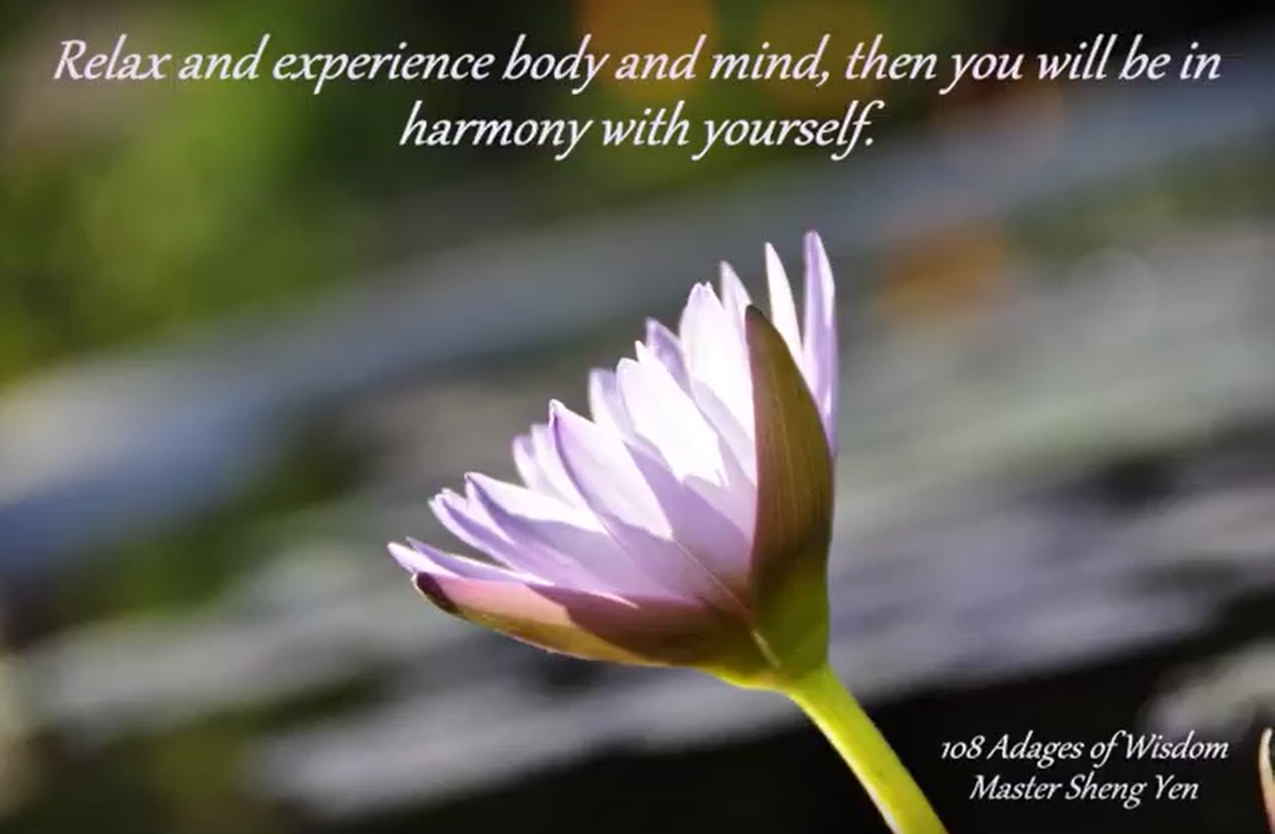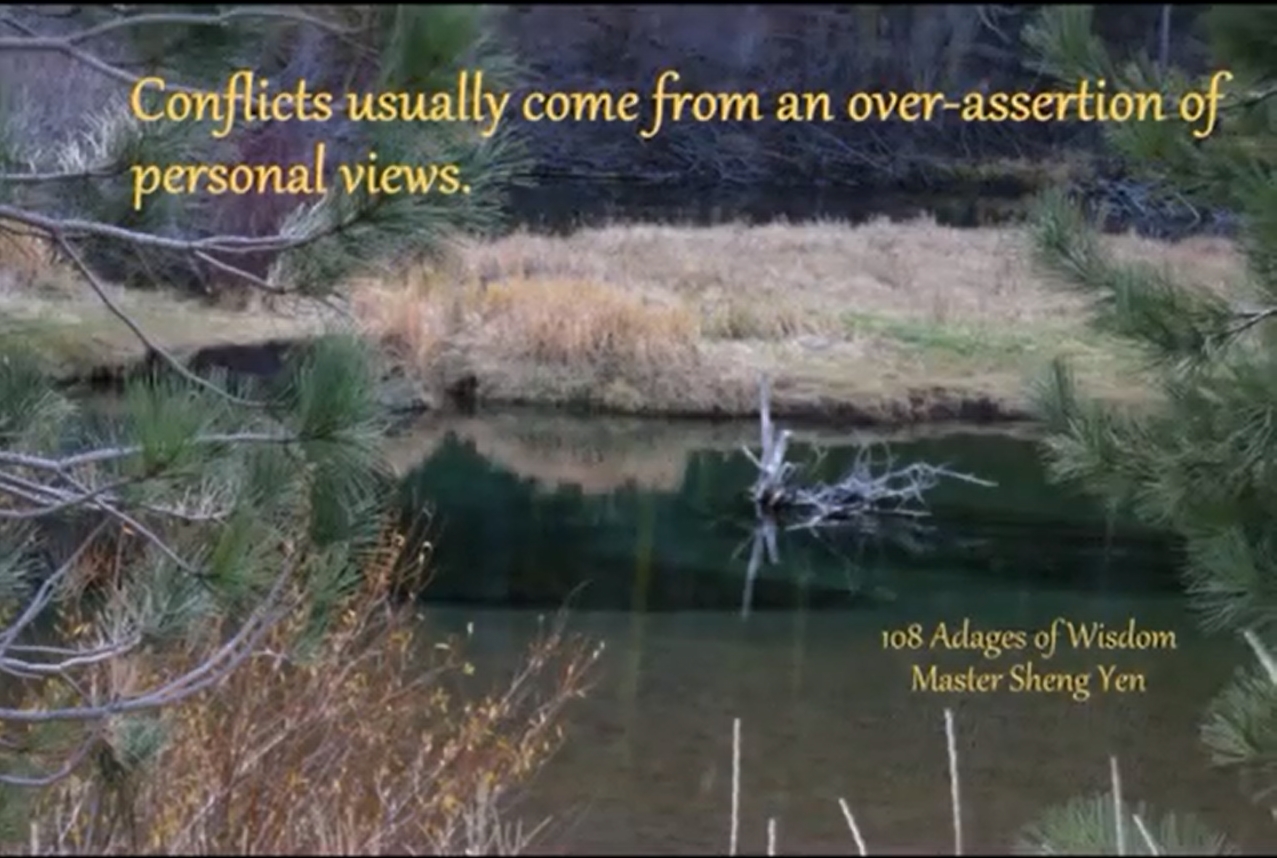About
 
Living a Carefree Life
Extended Reading:Video Clip: 108 Adages of Wisdom- I Video Clip: 108 Adages of Wisdom- III Video Clip: 108 Adages of Wisdom- IV 1. Be humble to those below and show respect to those above. These are important lessons for a bodhisattva practitioner. 2. Dedication rather than competition. Cherish blessings rather than indulgence. 3. Love yourself, others, and all sentient beings; rescue yourself, others, and all sentient beings. 4. An altruistic mind is a pure mind that does not ask for any result or reward. 5. The essence of possession and giving is love , but, one benefits the self, the second benefits others. Possession is self craving; giving stems from a great love that is selfless, joyful, and equanimous. 6. Self-disciplined by principle the bodhisattva does not demand of others what is inappropriate or impossible. 7. A bodhisattva is broad-minded and big-hearted. He is the steppingstone and path to accomplishment for others. 8. When others misunderstand you, first realize that the fault lies with you. 9. At a task think of others; in a mistake, look to yourself. 10. Accomplish your own ends by honoring others; reconcile hostility with respect to others; increase harmony with praise of others. 11. One who cannot let go of himself lacks wisdom; one who cannot let go of others lacks compassion. 12. Greet others with a blessing, gain friendship and peace at the same time. 13. Show friendship and extend a helping hand and you will emit the radiance of harmony, happiness, and peace. 14. Less quarreling leads to less controversy; more sincerity leads to more peace. 15. To affirm your strengths is self-confidence; to know your defects is growth; to understand others is respect. 16. Care for sentient beings and let go of your achievement. 17. When working together with a subordinate, show concern not blame, encouragement not arrogance, consultation not authority. 18. A forceful and stubborn person only hurts others without helping himself; a mild and patient person is at peace with himself and others. 19. To calm people you must harmonize with them. To gain respect, be a person who is mild and patient, for harmony unites people and mildness diffuses severity. 20. The meaning of life lies in constant learning and dedication; helping others leads to self-growth. 21. If wisdom is your measure, you will refrain from idle chatter. 22. Friendliness towards others brings a life of peace. 23. A bright person is not necessarily wise; a dull person not necessarily foolish. Wisdom is not the same as knowledge; it lies in how you treat others and handle yourself. 24. Compassion is to reduce others' vexations; wisdom is to reduce your own. 25. Do not force others to wear your shoes; do not confuse others' problems with your own. 26. Great merit lies in attending to others' suffering; Great wisdom lies in helping them solve their problems. 27. Once you realize that all phenomena in this world are impermanent, you will attain true inner peace. 28. Reap gratitude not hatred—you will live in harmony and joy. 29. A smile and a kind word are great giving that sow favorable conditions. 30. If you can reduce meaningless emotions, you will avoid unnecessary trouble. 31. Dedication repays gratitude; repentance disciplines the self. 32. Do your best to benefit others and in the process improve yourself. This is the measure of success. 33. How should you conduct yourself and deal with others? Be "square inside"—live by principle; and "round outside"—exercise expedience. 34. If you cannot help others, then at least refrain from hurting them. 35. Increase virtue in your speech; decrease ill will in speaking. These great merits will nurture blessings.
Living a Simple Life

36. Pursue what you will in harmony; keep hope in exertion. 37. Reduce the mind of gain and loss; and direct your effort to timely endeavor, and successful is likely. 38. The warmth of a family lies in mutual respect and love; the value of a family lies in mutual help and understanding. 39. As a boss, reduce the mind of gain and loss. Always keep honor and integrity in mind, so success will not pass you by. 40. When you hear gossip, calm down and examine yourself—correct mistakes and guard against new ones. Instability and impatience make gossip worse. 41. Suffering in our hearts increases our wisdom; hardship in our lives engenders appreciation of merit. 42. Life, always hopeful; death, always imminent. 43. Know clearly what you "need"; get rid of what you "want". 44. Treat the positive and the negative with a positive attitude. 45. With failure, strive again; with success, redouble your effort. This is the principle for peace and happiness in business. 46. Simplicity itself improves and protects the environment. 47. Maturity cares not about the past; wisdom does not doubt the present; an open-mind does not worry about the future. 48. Both favorable and unfavorable conditions strengthen us; treat them with equanimity and gratitude. 49. Treat past, future, fame, and position as not yours; try to live a happy and positive life; that itself is a life of bliss and freedom. 50. A diploma does not represent social standing; capability does not determine personality; fame does not bespeak virtue. No job is really high or low, only convention makes these distinctions. 51. Reconcile unhappiness with sincerity, affirmation, and decisiveness, rather than hesitation, passivity, and vacillation. 52. Worldly matters are never easy; but approach them with confidence and patience, and achievement will surely follow. 53. Live the present with no regret about the past and no regard for the future. 54. Reduce stress by diminishing the mind of gain and loss and increasing the mind of appreciation. 55. No resentment or regret about the past; active, positive preparation for the future with stability in every step. 56. Don't talk gratitude; act it. 57. Have no worry as you pass through the day. Find the right person; use the right method; the right moment will arise. 58. Abandon concern for gain and loss; an all-embracing wisdom appears before you. 59. Give your disease to the doctor and your life to the bodhisattva, then you'll be a healthy person with nothing to worry about. 60. A lack of self-understanding increases vexation. 61. Conduct yourself in this way: act with devotion, be at your best, always responsible and dutiful. 62. Employ "feelings" in personal concerns; "principle" in public matters. 63. Rather than attempt the impossible, cherish what you have. 64. Forget past, future, good and bad; stay only in the present. 65. If your really let go of everything, everything is tolerable; everything is yours. 66. Take up a method and you put forth effort; let go and you take it up again. Progress appears between taking up and letting go. 67. Do not compare with others; simply do your best. 68. Good and bad situations appear only through our eyes. 69. The end of a disaster is the time for the positive. Disaster has much to teach. 70. No greed or attachment—dignity is intact. 71. Cherish the present moment and each moment is unique. 72. Meddle in everything, problems and trouble multiply. Cast off gain and loss, you will experience liberation. 73. Happiness does not lie in fame or fortune, but in contentment and inner peace. 74. Keep your word; tell the truth with sincerity, use good words with goodwill— these are the merits of speech. 75. Ordinary people such as we should bear a sense of responsibility and let go of the mind of attachment. 76. Do not lose control in busyness, do not fall into boredom at leisure, the tide of life will not sway you this way and that. 77. When things go smoothly, do not let success go to your head; when encountering difficulties, do not lose heart. 78. Narrow-minded with no end to desire? then happiness will evade even the wealthy.
Maturing the Heart-Mind

79. Progress in simplicity, let glory shine in difficulty. 80. Strive for prosperity and show grace in adversity. 81. Possess a stable temperament and succeed. 82. A mind undistracted by circumstance is the result of meditation; a mind at one with circumstance is result of wisdom. 83. Take retreat as progress; silence as defense; devotion to others as the best way to self-growth. 84. The Buddha resides in our mind, speech, and daily life. 85. Compassion is feeling with intelligence; wisdom is intelligence with flexibility. 86. South, north, east, west are all fair direction; walking, standing, sitting, and lying are no other than the Path; bear contrition in mind often; repentance and repayment of gratitude yield the highest virtue. 87. A practitioner should be frank and sincere and harbor no evil thoughts; this is the meaning of "a straightforward mind is the path" (Vimalakirti Sutra). 88. When vexations occur, do not confront them head-on, but resolve them with a mind of shame, repentance, and gratitude. 89. To experience life wholeheartedly is Chan practice. 90. To possess health in body and mind is the greatest wealth. 91. Breathing is wealth and being alive is hope. 92. When the mind is knotted, best look inward where thoughts arise. 93. When vexed and troubled, enjoy the feeling of your own breathing. 94. When there is hindrance in the mind, the world is jarring; when there is no trouble in the mind, the world is in bright harmony. 95. When the mind is not open and clear, suffering occurs; when the mind is open and clear, suffering turns to happiness. 96. Rising and falling are normal conditions of the world. It takes a wise person to penetrate into the phenomena of rising and falling. 97. Turn your mind and turn your fate. 98. Wisdom is more than knowing the sutras; it means possessing the skill to transform vexations. 99. "Defilement is identical to enlightenment" does not mean that you do not have defilement, but that you do not treat defilement as defilement. 100. With even-mindedness and a peaceful disposition, life will be happy. 101. In facing anger, look within and examine the source of your anger. 102. When you are worried, you are occupied; when you let go, you are free. 103. Self-affirmation, self-improvement, and self-dissolution are three stages in the path from "self" to "no-self". 104. It is better to place emphasis on cultivating good causes rather than expecting pleasant results. 105. When you realize that you lack wisdom, your wisdom increases imperceptibly. 106. The mind should be like a wall—still and unwavering, yet always functioning. 107. Be like a dustless mirror that clearly reflects everything, but on which nothing adheres. 108. When people compete blindly, it is better to choose another path.

|